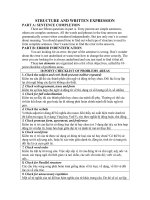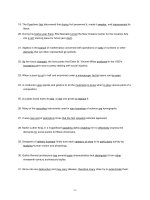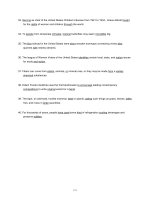Tài liệu TOEFL STUDY GUIDE PART 3-2 STRUCTURE AND WRITTEN EXPRESSION docx
Bạn đang xem bản rút gọn của tài liệu. Xem và tải ngay bản đầy đủ của tài liệu tại đây (14.62 KB, 7 trang )
TOEFL STUDY GUIDE
PART 3
STRUCTURE AND WRITTEN EXPRESSION
Sentence Completion Tips 49 - 50
Sentence Completion Tip 49
Process of Elimination:
m If there's no main verb, eliminate that answer choice.
Remember, a verb is an action word. It can express a physical
action, a mental action, or a state of being. For example:
n a physical action: "I went to the store".
n a mental action: "I think he likes me".
n a state of being: "I am very happy".
m Make sure the subject and verb agree in number. If you have
a plural subject, you must have a plural verb. For example,
"They are happy" or "I am happy".
m Find the subject. The subject can be a noun or a pronoun. A
noun is a person, place, thing, or idea. A pronoun is a word
that takes the place of a noun, such as "I, he, she, it, we, they,
you."
m What is the tense of the verb (i.e. present, past, or future
tense)
m Make sure the verb is conjugated. For example, the verb "to
sing" must be conjugated as:
n present tense:
n (I)"sing",
n (I)"am singing",
n (he, she, or it) "is singing", or
n (they, we, or you) "are singing".
n past tense:
n (I, he, she, it, you, they, we) "sang",
n future tense:
n (I, he, she, it, you, they, we) "will sing".
n If there's no main subject, eliminate that answer
choice.
n Figure out what is missing from the sentence.
n Look to see what action is taking place in the
sentence. Is it a physical action, a mental action, or a
state of being?
n Make sure the subject and verb agree in number, ie. if
your subject is plural (we, they, you) your verb must
be plural. For example:
n (We, they, or you) are happy.
n (I, he, she, or it) is happy.
n If you've found the main subject and the main verb,
what else could be missing?
n A modifier or dependent clause, such as, "Mr.
Smith who lives next door is a very nice man."
"who lives next door" modifies "Mr. Smith"
and tells who he is.
n a fixed expression which often starts a
dependent clause, such as, "which", "because
of", "in spite of", "that", or "who". For
example, "In spite of being smart, I found the
test was extremely hard".
n an expression of comparison, such as "more
than", "bigger than", "as many as", "as much as
possible", "greater than", "wider than", "longer
than", "farther than", "longer than", "as good
as", etc. For example, "As good as he was, she
was better".
n Locate the main subject and a main verb.
n Remember that "because" usually signals a dependent
clause which also contains a subject and verb but not
the main ones.
If there's no main subject or main verb:
This type does not occur very frequently. An example
would be, "There were no samples that matched the
pattern." "There is", "there are", "there were", "there
was", "it is", and "it was" are examples of no main
verb or subject and are classed as expressions.
Sentence Completion Tip 50
Strategy:
Locate the main verb.
Eliminate answers without conjugated verbs
Eliminate answers that do not agree with the subject in
number
Eliminate answers with verbs that are conjugated in the
wrong tense.
Locate the main subject.
Eliminate answers that use poor grammar, have diction
errors, or contain unnecessary words.
If there is a main subject and verb, take a look at the answer choices
to see what is missing.
Eliminate answers that do not agree with the rest of the sentence,
that contain errors of diction, or that contain extra words.
If there is no subject or verb, eliminate choices that do not supply
both a subject and a verb for the sentence or that do not agree with
the rest of the sentence.
Error Identification Tips 51 - 59
Structure: Error Identification TIP 51
You only have to FIND the error; you don't have to correct it!
In the next 7 tips you will see the "Seven Common Errors".
Structure: Error Identification TIP 52
Seven Common Errors: Error #1
m Verb Tense and Agreement
m Make sure the subject and verb agree in tense and in number









